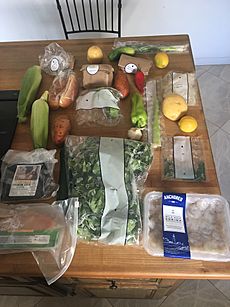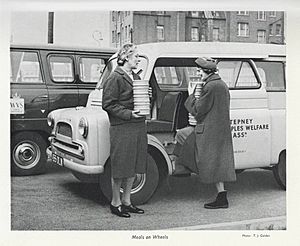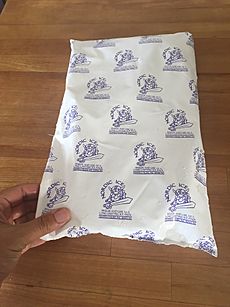Meal kit facts for kids
A meal kit is like a special box of ingredients delivered right to your home. Companies send you all the food you need, already measured out, along with easy recipes. This way, you can cook a fresh meal yourself!
Meal kits are different from meal delivery services. Those services send you food that is already cooked and ready to eat. With a meal kit, you get to be the chef and prepare the meal from scratch. It's a popular way for people to cook at home and try new dishes.
Contents
How Meal Kits Started: A Brief History
The idea for meal kits began in Sweden. Some people say it started in 2007 with a company called Middagsfrid, which means "dinnertime bliss." Others believe it began in 2008 with Linas Matkasse.
No matter which one started first, the idea quickly became popular in other parts of Europe. By 2012, meal kit companies like Blue Apron, HelloFresh, and Plated began offering their services in the United States.
The Business of Meal Kits: A Growing Trend
The meal kit business has grown a lot! By 2017, there were over 150 different meal kit companies in the United States. Globally, the industry was worth about $2.2 billion that year.
Even though this sounds like a lot, it was still a small part of the huge food market. Experts believe the meal kit industry will keep growing and become even more popular.
Many supermarkets have also started selling their own meal kits in stores. This shows how much people like the idea of having pre-portioned ingredients and recipes ready to go.
Some of the most popular meal kit services include Blue Apron and HelloFresh. Many customers try these services because of special offers, but not everyone continues to subscribe for a long time. Most people who use meal kits are young, live in cities, and have higher incomes.
Popular Meal Kit Services You Might Know
- Blue Apron
- Cook it
- Factor75
- Goodfood
- Gousto
- HelloFresh
- Home Chef
- Marley Spoon
- My Food Bag
- Plated
- Purple Carrot
- Sun Basket
Meal Kits and the Environment: What to Know
One thing people talk about with meal kits is their environmental impact. To keep food fresh during shipping, meal kits often include special freezer gel packs.
These gel packs can be tricky to recycle. Many of them contain a powder called sodium polyacrylate. This powder can absorb a lot of water and stay cold when frozen, but it's not always easy to dispose of in an eco-friendly way.
See also
 In Spanish: Kit de comida para niños
In Spanish: Kit de comida para niños




